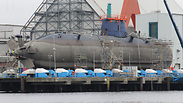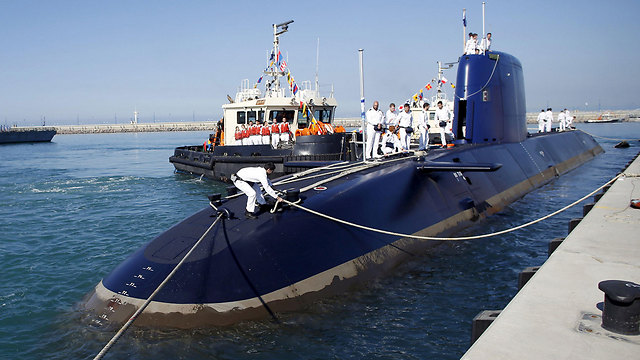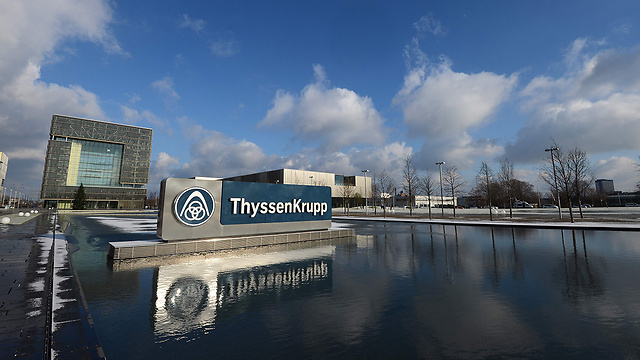
Navy officer: 'We would have preferred Egypt did not have German submarines'
A senior Navy officer outlines IDF's position on submarine procurement from German firm ThyssenKrupp; the army had no need for nine subs, he said, adding that the loss of exclusivity to Egypt went against Israel's security interests, despite the fact Egypt was not considered a threat.
A senior Israeli Navy officer commented at a military correspondents' briefing Monday on the German submarines Israel purchased from German firm ThyssenKrupp, which stand at the heart of a criminal investigation into both Prime Minister Benjamin Netanyahu and several of his confidants.
It marked the first time a senior officer spoke on the matter. In fact, the briefing was called to discuss the commencement of construction in Germany on the new Sa'ar 6-class corvettes, which are slated to arrive at the start of the next decade and are intended to defend Israel's natural gas offshore rigs.
The officer spoke frankly on the Navy's position, at least as it pertained to the deal reached between Germany and Israel on the sale of advanced submarines, as part of which Israel irregularly waived an exclusivity clause, thereby allowing ThyssenKrupp to sell four similar submarine to Egypt—according to publications not confirmed by the Navy.

The officer also stressed that while the Egyptian army had indeed been building up its force in the past decade, it was not considered a direct threat to Israel.
Yedioth Ahronoth uncovered this past July that in 2015 President Reuven Rivlin communicated the Israeli defense establishment's concern to Germany over ThyssenKrupp's intentions to sell submarines to Egypt.
German Chancellor Angela Merkel responded to Rivlin's reservations by noting that Israel had already authorized the deal with Egypt to move forward—without the defense establishment or the president being made aware of the fact.
In a different meeting, German officials claimed that the person who authorized the exclusivity clause's waiver was attorney Yitzhak Molcho, former envoy on diplomatic matters to Prime Minister Netanyahu who may soon face indictment for his part in the submarine affair—involving alleged impropriety by senior Israeli officials in the submarines' procurement.

Responding to a question on the number of submarines Israel needed, the officer—the person most knowledgeable on the matter—said, "The minimal number is five and the optimal number is six."
He further elaborated the optimal number of six submarines would allow five submarines to be active in operations at any given time, while one underwent maintenance work.
In any event, the officer stressed, "no one intended for us to have nine submarines"—giving credence to reports that the Navy intended to procure three submarines to gradually phase out of service three existing subs, rather than expand their cadre.
"The (submarine probe) affair is present and we aren't ignoring it," the officer added. "We're speaking to our people about it, but have no active role. The only question we ask ourselves is whether the submersibles are truly needed and whether they fit our operational needs. The answer is unequivocally yes."
"The affair has an impact (on the Navy) by its mere existence, but we continue to carry out our duties with enthusiasm," the officer further clarified.

On the advancement of the submarines' procurement, the officer said the Navy had resumed planning work on the three new subs with ThyssenKrupp's shipyards, following the German corporation's announcement that the deal was suspended due to the suspicions aroused relating to its completion.
Replying to a question regarding former MK Erel Margalit's claims that the submarines' blueprints were stolen in a cyber attack on ThyssenKrupp, the officer said he was unfamiliar with such an occurrence.
ThyssenKrupp itself provided comment on the matter Wednesday, saying, "ThyssenKrupp was the target of a cyber-attack in 2016. However, the attack was quickly discovered and repelled respectively. Our business unit Marine Systems was not affected by this event. Marine Systems works on and stores classified data in a closed network without any physical connection to the outside world."
On the topic for which the press originally convened—the Sa'ar 6-class corvettes—the officer divulged that four such defensive ships were purchased, along with dozens of interception missiles belonging to the naval Iron Dome system.Each ship will also be able carry a payload of precision-targeted offensive missiles with ranges of dozens of kilometers, as well as electronic and cyber warfare systems and an enormous radar dish.
The first ship, slated to arrive in 2020, will patrol the waters around Israel's gas rigs during routine operations. In emergencies, however, a ship will be stationed near each rig to defend them against Hezbollah's own precision-targeted missiles.










